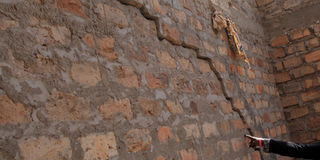Prime
Why bricks are preferred over blocks

Bricks are damage-prone but still preferred. PHOTO/file
What you need to know:
Blocks would appear to have the advantage over bricks when it comes to choice of materials but buyers do not always think so.
Construction completion is the dream of everyone that starts a building project. Ideally, between bricks and blocks, blocks would get the work done faster because blocks covers a bigger area than a brick. Thus, it falls to reason that one will need fewer blocks compared to bricks. That translates in lower labour costs because the masons and helpers will take a shorter duration on the site.
However, not many people have embraced blocks as many are still drawn to bricks, some of which are damaged by the time they get to the building site.
Authenticity
Aloysious Mutuku, a contractor with Concept MacFaj, explains that people will only use what they are sure of, unless they are open to trial and error, something uncommon on a building site. “It is easy to tell that a clay brick is what the seller says it is as well as a soil brick. This is fostered by where one would have purchased the bricks from because they are made from where the clay deposits or soil mounds are found.”
On the other hand, given the tendency towards ratio alteration, there is no guarantee that a block is authentic. “Some block makers will play around with the ratios to ensure that they get as much as possible from the available materials; stone dust, sand and cement. As such, the standard ratio is not followed and therefore having a standard block is not a given from any block depot. That way one may not be confident when buying blocks,” Mutuku explains, adding the ratio is one bag of cement, two wheelbarrows of stone dust and one wheelbarrow of lake sand and it should be able to give you 28 pieces of solid blocks.
When making some of these blocks, Lawrence Simiyu, a construction contractor, says some makers do not use stone dust but rough sand and add cement to produce them. “Normally, these kinds of blocks will not hold together for long as they start to disintegrate whereas when done well, blocks will hold like concrete would.” However, with bricks, the mix is either soil or clay and there is no two ways about it which makes it easier for one to trust what they are buying.
Bricks (clay and soil) are put in a mould, dried and then baked. However, with blocks, there are two ways of manufacturing them and it is hard to tell how one made their blocks. “One of the ways is using a machine with a piston which presses the mix to give you the block. The other method is where the mix is filled into a mould and banged with the hand. The latter block will not be as neat or as compact as the one worked on with a machine,” Mutuku explains. To avoid inconsistencies in quality, some people opt for bricks.
While bricks need no further treatment after being baked, blocks need curing (watering them) to allow the mix to harden well and avoid disintegration owing to dryness. However, Mutuku says not all blocks are well cured. Therefore, after a while, they will not be able carry the weight they were intended to. “However, with bricks, after being baked, it will not disintegrate unless mishandled which also applies to blocks.”
Blocks are heavier than bricks so one building a storied building will prefer to use blocks at the bottom floor to enable it carry weight. With subsequent floors, Simiyu says, they will use bricks, more so when there are several partitions they need to make. “That way, there is less load imparted on the slab unlike with blocks, even the hollow ones as their weight is twice as much. If one is to use blocks all the way, the slab has to be well reinforced to avoid compromising the quality of the building. That calls for using more reinforcing material which drives up the cost.”
Better foundation
With regard to the foundation, Mutuku says people always prefer to use bricks. “If one uses blocks that are not made to standard, and the area tends to get waterlogged, they will start to disintegrate whereas bricks will not do that. Even with lots of water, while bricks may soak, with time, they will dry up and get back to normal hence an uncompromised foundation.”
The blocks might seem cheaper because you need less compared to bricks but Mutuku says that ultimately, the mason that lays your bricks will ask for a slightly higher wage compared to when laying bricks. “The same applies to the hired hand because they say, the blocks are heavier thus cumbersome to carry around. More to that, being solid, when making a corner, it is harder to break a standard block than it is for a brick which leads to delays.” He adds that the only difference in cost would be in the amount of mortar as one would need more for bricks than for blocks.
The mindset is also key as some just have a bias towards bricks because that is what they are accustomed to. “For example, some of the masons will say they wish you (client or foreman) had just brought bricks, they would have moved faster. The truth in that might be questionable but one’s mindset matters in how well and fast they get the job done,” Lawrence Simiyu shares.




